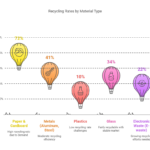A temporary workers agency, also known as a staffing agency, acts as an intermediary between businesses needing additional or specialized labor and individuals seeking temporary or contract employment. These agencies recruit, screen, and employ workers, providing flexible staffing solutions for companies across sectors like manufacturing, healthcare, and customer service. For businesses looking to understand how staffing agencies streamline the hiring process and reduce operational stress, learn more about staffing solutions to see how they can meet specific industry needs.
Who Pays Workers’ Compensation Insurance for Temporary Staffing Agencies?
Workers’ compensation insurance for temporary workers is typically the responsibility of the staffing agency, as they are the legal employer of the temporary workers they place. This setup relieves client companies from direct responsibility for covering workers’ compensation, which is managed by the agency instead. However, client companies must verify that their staffing agency complies with local workers’ compensation laws to avoid potential liability.
If your organization is exploring temporary staffing as a way to fill critical roles, it may be helpful to reach out to an agency with on-demand workforce solutions for more details on managing insurance coverage and compliance.
Can Temporary Workers Use Two Staffing Agencies?
Yes, temporary workers often have the flexibility to work with multiple staffing agencies simultaneously. This practice can increase their chances of securing more assignments and maximize their income, especially in high-demand fields. However, workers should ensure there’s no overlap in their assignments from different agencies to avoid scheduling conflicts and potential breaches of agreement.
For a better understanding of managing flexible schedules and leveraging multiple agency partnerships, consult resources on temporary staffing to optimize both worker and employer benefits.
How to Hire Temporary Workers
Hiring temporary workers through an agency is often more straightforward than direct hiring. Here’s a step-by-step outline to get started:
- Define Your Needs: Determine the roles and skills needed for temporary assignments.
- Choose a Reputable Agency: Look for agencies experienced in your industry. Agencies specializing in fields like healthcare or industrial staffing have insights that can improve worker fit and productivity. For example, a factory staffing agency is particularly equipped to manage the specific challenges of manufacturing environments.
- Review Agency Terms: Understand the costs, services, and processes, including how workers are screened and assigned.
- Communicate Expectations: Ensure the agency understands your performance standards, job requirements, and safety protocols to minimize potential issues.
To hire temporary staff that meets your requirements effectively, see if a quote from a specialized agency aligns with your project’s scope.
Hiring Temporary Foreign Workers in Canada
For companies in Canada looking to hire temporary foreign workers, there are additional steps due to specific work permits and compliance regulations. Employers should be familiar with the Temporary Foreign Worker Program (TFWP), which provides permits for foreign workers to fill labor shortages. Consulting with a Canadian staffing agency with experience in handling foreign worker compliance, such as RSS Staffing Canada, can streamline the hiring process and ensure adherence to Canadian labor laws.
Advantages of Using Temporary Workers
Temporary workers bring several advantages to organizations, making them a valuable option in today’s dynamic labor market. Some of these benefits include:
- Flexibility: Temporary workers allow companies to scale their workforce according to demand. This flexibility is especially useful in industries with seasonal peaks or project-based needs.
- Reduced Hiring Risk: Since the staffing agency handles recruitment, background checks, and employment, businesses can save time and resources. The agency also provides replacements if a temporary worker doesn’t meet expectations.
- Cost Savings: Companies often find it more cost-effective to hire temporary staff, as they avoid long-term commitments and employee benefits costs. For those looking to maximize workforce efficiency, the use of manufacturing staffing solutions can significantly reduce overhead costs.
Disadvantages of Using Temporary and Contract Workers
Despite the benefits, using temporary workers can have drawbacks:
- Training and Integration: Temporary workers may lack familiarity with company culture and processes, requiring additional time for onboarding and training.
- Limited Commitment: Since temporary workers are often focused on short-term assignments, they may not have the same level of investment as permanent employees.
- Potential for High Turnover: Due to the nature of temporary work, there can be frequent turnover, necessitating ongoing recruitment efforts.
For insights on minimizing turnover while using temporary labor, explore strategies for reliable workforce solutions designed for high-demand environments.
Why Do Companies Use Temporary Workers?
Companies turn to temporary staffing for numerous reasons:
- Seasonal Demand: Retailers, manufacturers, and warehouses often need extra help during peak seasons. Temporary staffing allows them to respond to these fluctuations without committing to permanent hires.
- Project-Specific Roles: For short-term projects, temporary workers are an efficient solution to access specialized skills.
- Cost Management: By using temporary staff, businesses reduce costs associated with recruitment, benefits, and severance.
To find out how temporary workers can fit into your organization’s operational model, explore projects completed by staffing agencies that have met similar needs.
Are Temporary Workers Considered Employees?
Yes, temporary workers are considered employees of the staffing agency rather than the client company. The agency handles payroll, benefits, and compliance with labor laws. For companies, this setup provides a streamlined workforce solution without the added administrative burden of directly managing employee benefits and other HR tasks. This setup allows companies to focus on productivity while ensuring that labor compliance is handled by the staffing agency.
To learn more about managing compliance and employee requirements, consider solutions for healthcare staffing to address industry-specific challenges.

Key Considerations When Working with Temporary Staffing Agencies
Temporary staffing agencies offer a flexible solution to manage workforce needs, but partnering with the right agency requires some due diligence. Below are essential factors to consider when engaging with a staffing agency to maximize efficiency, compliance, and alignment with your operational goals.
1. Understanding Compliance and Legal Responsibilities
Employers must understand the legal aspects of hiring through a staffing agency. The agency, as the employer of record, is responsible for aspects like payroll, employment taxes, and workers’ compensation. This setup protects the hiring company from the administrative and legal burdens associated with direct employment. However, hiring companies are still responsible for maintaining a safe workplace, adhering to anti-discrimination laws, and ensuring that temporary workers’ roles align with their contractual obligations.
Compliance is especially critical in regulated industries like healthcare and manufacturing, where standards are high, and safety is paramount. For guidance on managing these responsibilities, manufacturing staffing solutions offer insight into maintaining compliance while optimizing workforce flexibility.
2. Evaluating Cost Structures and Billing Transparency
Cost structures can vary widely between staffing agencies, impacting your budget and financial planning. Agencies charge for their services in different ways, including hourly rates or project-based fees. Additionally, the agency markup (an added percentage on top of the worker’s wage to cover administrative costs and agency profit) should be reviewed and compared among multiple providers. Transparency in billing ensures that there are no hidden fees, and that you can accurately forecast labor expenses.
For those looking for cost-effective options without compromising on quality, an agency specializing in on-demand workforce solutions may offer competitive pricing structures that suit short-term or project-based needs.
3. Choosing the Right Staffing Model: Temporary, Temp-to-Hire, or Contract-to-Hire
Depending on your needs, you might prefer different staffing models:
- Temporary Staffing: Provides workers for a specific period, ideal for covering seasonal spikes or project demands.
- Temp-to-Hire Staffing: Allows a trial period to determine if the worker fits the company culture and role requirements before making a permanent hire.
- Contract-to-Hire Staffing: Useful for specialized roles, this model helps companies evaluate highly skilled professionals over a fixed period before committing to a long-term role.
Each model has its benefits and limitations, so choosing one that aligns with your business goals can optimize both flexibility and resource allocation. For specialized insights into models that work in various sectors, explore options from a factory staffing agency, which can address the unique requirements of industrial environments.
How to Retain High-Quality Temporary Workers
Retention is not usually the primary focus with temporary workers; however, retaining quality temps over multiple assignments can improve continuity and reduce training costs. Here are a few strategies to consider:
Offering Competitive Wages and Benefits
Temporary workers who feel adequately compensated are more likely to stay with an agency, leading to improved availability and loyalty when your company needs them. Many agencies also provide basic benefits such as healthcare, which can increase worker satisfaction and retention rates.
Recognizing Contributions and Providing Feedback
Even for temporary roles, recognizing strong performance can go a long way. Simple acknowledgments and constructive feedback contribute to a positive work environment and increase the likelihood that a temp worker will seek out further assignments with your company.
Why Temporary Workers are Ideal for High-Demand Environments
Temporary workers excel in high-demand environments where workforce needs fluctuate. Here’s why temporary workers are often preferred in such scenarios:
Flexibility in Workforce Scaling
Hiring temporary staff allows companies to scale up their workforce rapidly to meet peak demands without the commitment of permanent hires. Retailers, event organizers, and logistics companies frequently use this model to handle season-specific workloads.
Cost Control and Budget Management
By limiting temporary hires to specific tasks and projects, companies can better control their budgets. Temporary staffing can be more cost-effective, especially when using agency resources like a healthcare staffing agency to manage payroll, benefits, and administrative responsibilities for each worker.
Fast Access to Skilled Labor
Staffing agencies often have access to a network of skilled professionals who can fill roles quickly. For example, a factory staffing agency might provide highly trained workers with expertise in operating machinery or assembly line work, reducing onboarding time.
Disadvantages of Using Temporary Workers and How to Mitigate Them
Despite their many benefits, temporary workers can bring certain challenges. Here are common drawbacks and mitigation strategies:
1. Reduced Commitment and Motivation
Temporary workers may not exhibit the same level of dedication as permanent staff, which can impact productivity. To mitigate this, provide clear expectations and goals from the outset. A small gesture, like providing orientation or acknowledging contributions, can foster a sense of belonging.
2. Knowledge Gaps and Training Needs
Temporary workers may lack familiarity with your company’s systems and processes. Investing in a streamlined onboarding program can quickly equip temps with the information they need to perform effectively.
3. Higher Turnover Rates
Temporary work is often characterized by high turnover. When turnover becomes a hindrance, using on-demand workforce solutions that can reliably replace departing temps can minimize disruptions.
Frequently Asked Questions About Temporary Staffing
Can temporary workers work with more than one agency?
Yes, temporary workers can engage with multiple agencies. This flexibility allows them to find more frequent work and optimize their schedules. For employers, using workers who engage with multiple agencies can ensure access to talent that might not be available through a single agency.
Who is responsible for workers’ compensation?
The staffing agency, as the employer of record, typically provides workers’ compensation. However, businesses should confirm coverage specifics with the agency to ensure compliance.
What happens if a temporary worker gets injured on the job?
The agency’s workers’ compensation policy generally covers temporary workers. However, the client company must maintain a safe workplace to minimize injury risks and potential liability issues.









